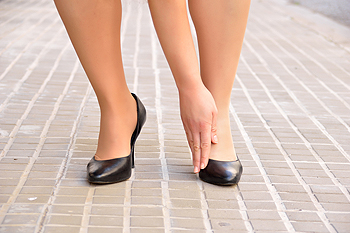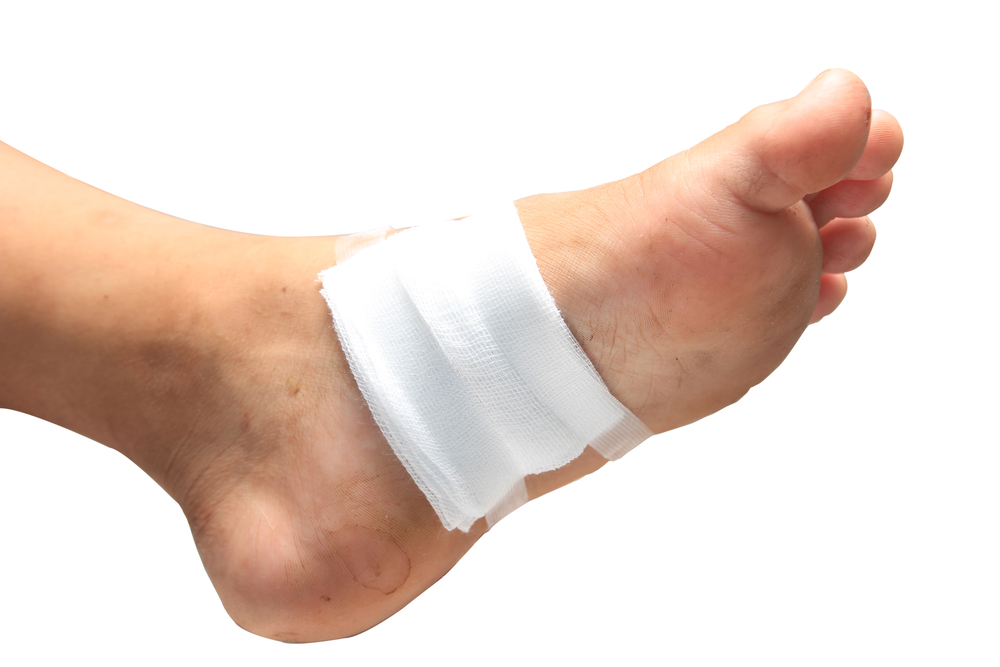Connect With Us
Blog
Items filtered by date: August 2020
Do Your Child's Feet Hurt?
Possible Foot Conditions That May Result From Wearing High Heels
 The potential dangers of frequently wearing high heels may outweigh the appeal of the attractiveness these types of shoes can possess. There are uncomfortable foot conditions that can develop as a result of wearing high heels, consisting of bunions, hammertoes, and corns. Many of these ailments may be prevented by choosing shoes that fit correctly, and the feet may feel better when the toes are exposed. It is beneficial to treat existing blisters with a protective covering as high heels are worn, and it may help to wear flatter shoes as the healing process occurs. If you would like additional information about how wearing high heels can affect your feet, it is suggested that you consult with a podiatrist.
The potential dangers of frequently wearing high heels may outweigh the appeal of the attractiveness these types of shoes can possess. There are uncomfortable foot conditions that can develop as a result of wearing high heels, consisting of bunions, hammertoes, and corns. Many of these ailments may be prevented by choosing shoes that fit correctly, and the feet may feel better when the toes are exposed. It is beneficial to treat existing blisters with a protective covering as high heels are worn, and it may help to wear flatter shoes as the healing process occurs. If you would like additional information about how wearing high heels can affect your feet, it is suggested that you consult with a podiatrist.
High heels have a history of causing foot and ankle problems. If you have any concerns about your feet or ankles, contact one of our podiatrists from New England Foot and Ankle. Our doctors can provide the care you need to keep you pain-free and on your feet.
Effects of High Heels on the Feet
High heels are popular shoes among women because of their many styles and societal appeal. Despite this, high heels can still cause many health problems if worn too frequently.
Which Parts of My Body Will Be Affected by High Heels?
- Ankle Joints
- Achilles Tendon – May shorten and stiffen with prolonged wear
- Balls of the Feet
- Knees – Heels cause the knees to bend constantly, creating stress on them
- Back – They decrease the spine’s ability to absorb shock, which may lead to back pain. The vertebrae of the lower back may compress.
What Kinds of Foot Problems Can Develop from Wearing High Heels?
- Corns
- Calluses
- Hammertoe
- Bunions
- Morton’s Neuroma
- Plantar Fasciitis
How Can I Still Wear High Heels and Maintain Foot Health?
If you want to wear high heeled shoes, make sure that you are not wearing them every day, as this will help prevent long term physical problems. Try wearing thicker heels as opposed to stilettos to distribute weight more evenly across the feet. Always make sure you are wearing the proper shoes for the right occasion, such as sneakers for exercising. If you walk to work, try carrying your heels with you and changing into them once you arrive at work. Adding inserts to your heels can help cushion your feet and absorb shock. Full foot inserts or metatarsal pads are available.
If you have any questions please feel free to contact one of our offices located in Chelmsford and Newburyport, MA . We offer the newest diagnostic and treatment technologies for all your foot and ankle needs.
Read more about Effect of High Heels on the FeetCaring for Foot Ulcers
 For diabetic patients especially, knowing how to care for their wounds is incredibly important. Performing daily foot checks for any abnormalities, such as cuts, scrapes, and bruising, can be helpful in early detection of any underlying serious foot conditions. Diabetic patients may commonly experience issues with the condition known as neuropathy. Neuropathy can make it difficult to feel if you’ve damaged your feet, as this condition disrupts the nerves. When scrapes or cuts go undetected they can become infected and turn into foot ulcers, creating deep, slow healing wounds. In order to properly treat a foot ulcer, it’s best that you seek the care of a podiatrist.
For diabetic patients especially, knowing how to care for their wounds is incredibly important. Performing daily foot checks for any abnormalities, such as cuts, scrapes, and bruising, can be helpful in early detection of any underlying serious foot conditions. Diabetic patients may commonly experience issues with the condition known as neuropathy. Neuropathy can make it difficult to feel if you’ve damaged your feet, as this condition disrupts the nerves. When scrapes or cuts go undetected they can become infected and turn into foot ulcers, creating deep, slow healing wounds. In order to properly treat a foot ulcer, it’s best that you seek the care of a podiatrist.
Wound care is an important part in dealing with diabetes. If you have diabetes and a foot wound or would like more information about wound care for diabetics, consult with one of our podiatrists from New England Foot and Ankle. Our doctors will assess your condition and provide you with quality foot and ankle treatment.
What Is Wound Care?
Wound care is the practice of taking proper care of a wound. This can range from the smallest to the largest of wounds. While everyone can benefit from proper wound care, it is much more important for diabetics. Diabetics often suffer from poor blood circulation which causes wounds to heal much slower than they would in a non-diabetic.
What Is the Importance of Wound Care?
While it may not seem apparent with small ulcers on the foot, for diabetics, any size ulcer can become infected. Diabetics often also suffer from neuropathy, or nerve loss. This means they might not even feel when they have an ulcer on their foot. If the wound becomes severely infected, amputation may be necessary. Therefore, it is of the upmost importance to properly care for any and all foot wounds.
How to Care for Wounds
The best way to care for foot wounds is to prevent them. For diabetics, this means daily inspections of the feet for any signs of abnormalities or ulcers. It is also recommended to see a podiatrist several times a year for a foot inspection. If you do have an ulcer, run the wound under water to clear dirt from the wound; then apply antibiotic ointment to the wound and cover with a bandage. Bandages should be changed daily and keeping pressure off the wound is smart. It is advised to see a podiatrist, who can keep an eye on it.
If you have any questions, please feel free to contact one of our offices located in Chelmsford and Newburyport, MA . We offer the newest diagnostic and treatment technologies for all your foot care needs.
Read more about Wound CareBlog Archives
- April 2025
- March 2025
- February 2025
- January 2025
- December 2024
- November 2024
- October 2024
- September 2024
- August 2024
- July 2024
- June 2024
- May 2024
- April 2024
- March 2024
- February 2024
- January 2024
- December 2023
- November 2023
- October 2023
- September 2023
- August 2023
- July 2023
- June 2023
- May 2023
- April 2023
- March 2023
- February 2023
- January 2023
- December 2022
- November 2022
- October 2022
- September 2022
- August 2022
- July 2022
- June 2022
- May 2022
- April 2022
- March 2022
- February 2022
- January 2022
- December 2021
- November 2021
- October 2021
- September 2021
- August 2021
- July 2021
- June 2021
- May 2021
- April 2021
- March 2021
- February 2021
- January 2021
- December 2020
- November 2020
- October 2020
- September 2020
- August 2020
- July 2020
- June 2020
- May 2020
- April 2020
- March 2020
- February 2020
- January 2020
- December 2019
- November 2019
- October 2019
- September 2019
- August 2019
- July 2019
- June 2019
- May 2019
- April 2019
- March 2019
- February 2019
- January 2019
- December 2018
- November 2018
- October 2018
- September 2018
- August 2018
- July 2018
- June 2018
- May 2018
- April 2018
- March 2018
- February 2018
- January 2018
- December 2017
- November 2017
- October 2017
- September 2017
- August 2017
- July 2017
- June 2017
- May 2017
- April 2017
- March 2017
- February 2017
- March 2016

